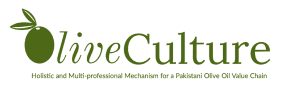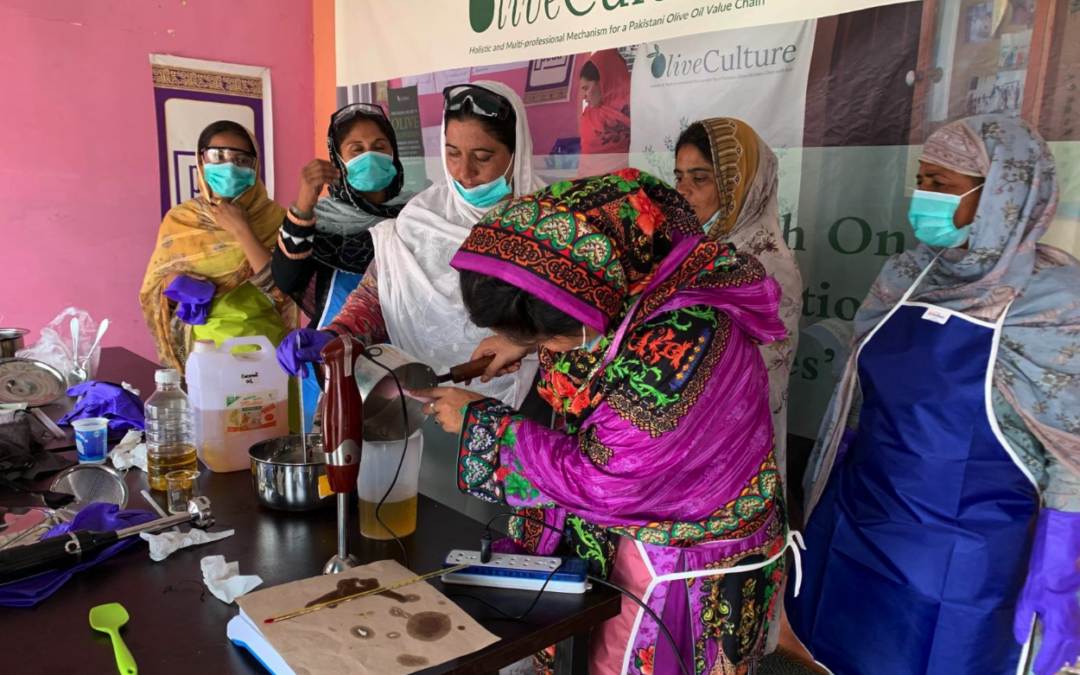The role of women in the olive industry is often overlooked. Women play a crucial role not only in the olive value chain and by products, from planting and harvesting to processing and marketing, and also in the making of value-added olive products such as soaps, shampoo, cosmetics, and pickles. However, they face numerous challenges, including limited access to resources, lack of technical skills, and gender-based discrimination.
The OliveCulture Project is working to address these challenges and promote women’s entrepreneurship in the olive value addition and by-products industry. In this blog post, we will explore the OliveCulture Project’s efforts and struggles to uplift the socio-economic status of women in Pakistan. We will also discuss the importance of technical training provided by OliveCulture experts for women and youth on olive value addition products and by-products.
Empowering Women and Youth in the Olive Value Chain in Pakistan:
The OliveCulture project is an Italian Government-funded initiative aimed at promoting the olive value chain in Pakistan. The project is expected to yield outcomes and results such as the valorization of the agronomic, cultural, and social heritage of the olive oil value chain. Rural development within the olive value chain is supported through technical assistance and training from Italian experts, empowering women and youth, and improving the Pakistani olive value addition chain at various levels. This initiative empowers women and young people significantly within the olive value-addition chain by providing technical training on olive value-added products and fostering business development for olive by-products.
Promoting Women’s Entrepreneurship and Supporting Rural Communities:
The OliveCulture Project is working to support rural communities by promoting women’s entrepreneurship in the olive value addition. The project provides technical training to women and youth on olive value addition products and by-products, including olive oil, pickles, table olives, cosmetics, soaps, and much more. By offering technical training and support, the project helps women and youth develop the necessary skills to start their businesses and become successful entrepreneurs. Additionally, the project is working to build the capacity of local organizations to support women and youth in the olive value addition chain. This includes providing training on gender equality and women’s empowerment, as well as supporting the development of women-led cooperatives.
Creating New Job Opportunities and Enhancing Women and Youth Capacities:
By providing technical training and support, the OliveCulture project is helping women and youth start their businesses and become self-sufficient. This not only creates new job opportunities but also helps reduce unemployment and poverty in rural communities. OliveCulture is also assisting women and youth by providing them with skillful knowledge about the preparation, packing, marketing, and storage of olive value-added products. Additionally, OliveCulture celebrates the resilience and strength of women and youth in the olive industry, the project is working to connect women and youth with markets for their products, helping them increase their income and improve their livelihoods.
The Importance of OliveCulture Technical Training Program:
The technical training offered by the OliveCulture Project is essential for promoting women and youth empowerment in the unreached areas of Pakistan. This training covers a range of topics, including product development and quality control, as well as business management and marketing skills. By providing this training, the OliveCulture Project is helping women and youth develop the necessary skills to start their businesses and become successful entrepreneurs. These technical assistance and trainings will create more opportunities for in unreached and neglected rural communities of Pakistan. OliveCulture, believe in the power of women and youth to drive economic growth and transform communities. By enhancing the capacities of women and youth in the olive industry, it not only improves the development outcomes for the next generation but will also make institutions and policies more inclusive.
The OliveCulture’s Role in Pakistan:
The OliveCulture Project is playing an important role in promoting women and youth, empowering with advanced skills in the olive value addition chain. The project operates in remote and marginalized areas of Pakistan, such as KPK and Balochistan, where women and youth face significant challenges in accessing resources and opportunities. By providing technical training and support in these unreached areas and communities, the project is helping empower women and youth while improving their socio-economic status. Additionally, the project is working to connect women and youth with markets for their products and assisting them in creating more opportunities for themselves in the olive industry
In conclusion, the OliveCulture Project is making significant contributions to the olive value addition chain in Pakistan. The project provides technical training to women and youth on olive value addition products and by-products, helping them improve their skills and knowledge. This, in turn, leads to better job opportunities and higher incomes for women. Additionally, the project raises awareness about the importance of women’s participation in the olive value addition chain.
The OliveCulture Project also addresses the challenges faced by women and youth in the olive industry and promotes women and youth entrepreneurship. By providing technical training and support, the project helps women and youth develop the necessary skills to start their businesses and become successful entrepreneurs. The project creates new job opportunities, enhances women and youth capacities, and reaches unreached communities. Through these efforts, the OliveCulture Project improves the socio-economic status of women and youth, enabling them to become self-sufficient contributors to the growth of the olive value addition chain in Pakistan.

